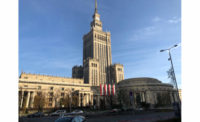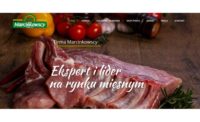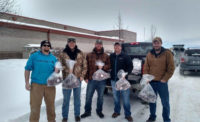When not participating in seminars on European exports and North American consumer trends, the guests of the Union of Producers and Employers of Meat Industry (UPEMI) were able to walk around Warsaw. The UPEMI representatives who joined us pointed out some of the sights and historic buildings in the area. Most of the city, due to destruction from World War II and the Soviet occupation that followed, was rebuilt in the 1950s or later. In spite of the damage that had been done to the city, today’s Warsaw is vibrant, modern and exciting. The feeling was similar at the processing plants that we visited. Even though they may have been started during uncertain economic and political times, the companies weathered the down times and came out stronger on the other side. The plants were high-tech and producing high-quality meats for customers in Poland and around the world.
The second company that we visited was Skiba Meat Company, located in Chojnice. The company was founded by Andrzej and Miroslawa Skiba in 1991 as a processing plant, and it has grown to become one of the largest processors in the country. Despite the size, the company is still very family-oriented. Two of the Skibas’ daughters work in the company, and another is expected to join one day. Numerous employees have been with the company for many years, adding to the extended family feel.
Editor's Note
Sam Gazdziak was invited to Warsaw, Poland late last year to participate in a seminar about North American consumer trends for an audience of European meat exporters. He was also part of a group that toured two Polish meat plants.
As we toured the plant, it was evident that European meat processors take great strides to ensure product that is shipped around the world is produced, packed and shipped to the highest standards. At multiple steps along the way, meats destined for export are weighed, verified, re-weighed and checked for proper temperature. Given the sensitive nature of meat, the process to ship from Europe to North or South America, Africa or Asia involves multiple verifications and constant data logging.
Traceability is also a prominent feature in Europe. As pig carcasses are broken down, containers of meat cuts zip to the next department on conveyors, and everything is electronically monitored. Skiba slaughters approximately 4,000 animals per day, and the production lines we witnessed combined Old World butchering skills with cutting-edge traceability systems.
Skiba employs more than 1,000 employees overall and 580 at the Chojnice location, which handles some of the slaughter, fabrication and shipping for export. Along with a further-processed plant and an additional slaughterhouse, Skiba also runs 69 markets in northern Poland. Those meat markets sell minced pork and other fresh meats, hams, sausages (parówki), thin sausages and other cured meats. About 40 percent of the company’s overall production is for export, as it ships to about 40 countries over six continents.
Thank you to UPEMI for the opportunity to visit my family’s homeland and to learn about the European meat processing industry. It was fascinating to learn about a side of the world’s meat industry that I would have otherwise missed.
(The content of this article reflects exclusively the opinion of its author and is subject to his sole responsibility. The European Commission does not bear the responsibility for any possible use of the information contained herein.)





Report Abusive Comment